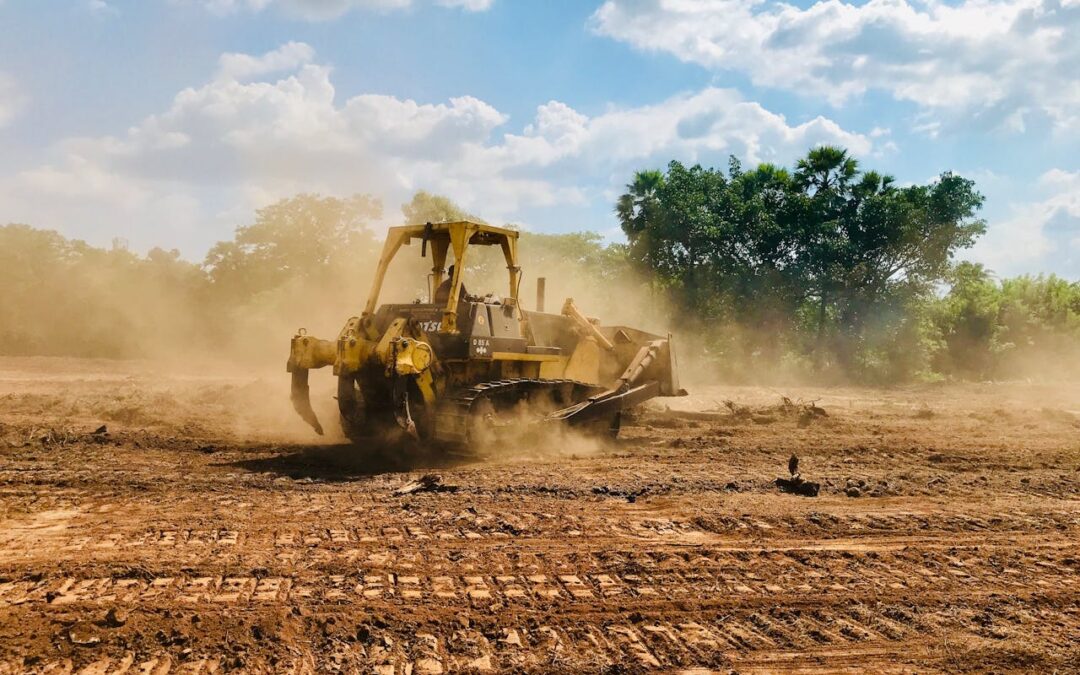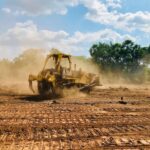When planning a construction or landscaping project, one of the first questions that comes up is: Excavation vs land clearing – which comes first? While both processes are essential to preparing a site, understanding the difference between them and knowing when to schedule each is critical for project success.
Whether you’re building a home, installing a septic system, or developing commercial land, this guide will help you determine what step to take first — and why.
What Is Land Clearing?
Land clearing is the process of removing obstacles such as trees, stumps, rocks, brush, and other vegetation from a plot of land. It’s essentially about making the property workable and safe for future development.
Common Land Clearing Tasks:
- Tree and brush removal
- Stump grinding
- Debris hauling
- Overgrowth management
- Clearing rocks and large obstructions
Land clearing sets the foundation for visibility, access, and safety. Without it, excavation equipment may not even reach the intended areas.
What Is Excavation?
Excavation is the process of digging, trenching, or grading the land to create a proper foundation for construction. It’s usually done after the land has been cleared and focuses on reshaping the terrain.
Common Excavation Services:
- Digging foundations and basements
- Trenching for utility lines
- Grading and leveling soil
- Creating retention ponds or drainage systems
- Preparing for driveways or roadbeds
Excavation requires precise measurements and planning. This is where heavy-duty equipment like backhoes, bulldozers, and excavators come into play.
Excavation vs Land Clearing: The Core Differences
Although excavation and land clearing are both preparatory services, they serve distinct purposes.
| Feature | Land Clearing | Excavation |
|---|---|---|
| Purpose | Remove vegetation and debris | Shape the land for building |
| Timing | First step in site prep | Follows land clearing |
| Tools Used | Chainsaws, mulchers, bulldozers | Excavators, trenchers, graders |
| Focus Area | Surface cleanup | Below-surface digging and shaping |
| Typical Use Cases | Preparing raw land | Installing foundations, drainage, etc. |
When comparing excavation vs land clearing, it’s clear that land clearing is the gateway to starting any earthwork, while excavation fine-tunes the land for actual construction.
Which Should You Do First?
In almost every scenario, land clearing comes before excavation. That’s because you need a clean, obstruction-free site before any meaningful digging or grading can begin.
Here’s Why Land Clearing Comes First:
- Accessibility for Equipment
Trees, rocks, or brush can block access for excavation machinery. Clearing creates clear paths for heavy equipment to operate safely. - Site Visibility
Removing overgrowth reveals the true topography of the land, helping contractors properly evaluate the site before excavation. - Accurate Measurements
Excavation requires precise layout and elevations. A cleared plot ensures surveyors and engineers can work with accurate, unobstructed land data. - Safety First
Loose limbs, stumps, or debris can cause accidents during excavation. Clearing helps mitigate these hazards ahead of time.
When Might Excavation Come First?
While rare, there are a few niche situations where limited excavation might be performed before full land clearing. For example:
- Utility Emergencies: If underground repairs are urgently needed, trenching might happen before full clearing.
- Selective Projects: A homeowner might only want a trench dug in an already semi-cleared backyard.
- Minimal Tree Cover: On already clear land, light excavation may occur without major clearing.
However, for large-scale construction or landscaping, land clearing always leads.
How to Plan Your Site Prep Step-by-Step
If you’re preparing land in Tennessee for development, here’s a simple roadmap to follow:
1. Site Assessment
Start with a professional site visit to assess tree density, slope, drainage, and soil conditions.
2. Land Clearing
Remove all vegetation, stumps, and surface debris using specialized clearing equipment. This also includes mulching or hauling off the cleared materials.
3. Excavation and Grading
Once cleared, excavation teams dig, level, or reshape the land based on your construction plans. This step may also include trenching for plumbing or electrical work.
4. Foundation or Structure Installation
With land cleared and shaped, contractors can pour concrete, install utilities, or begin vertical construction.
Planning each step helps save time, reduce costs, and avoid costly mistakes down the road.
How Long Does Each Process Take?
Timeframes depend on land size, complexity, and weather.
| Process | Typical Duration |
|---|---|
| Land Clearing | 1–5 days |
| Excavation | 2–7 days |
On average, a medium-sized residential plot can be fully cleared and excavated in about a week, weather permitting.
What Equipment Is Used for Each?
Having the right tools is key. Here’s a quick breakdown of the most common machinery:
Land Clearing Equipment:
- Skid steers with mulching heads
- Forestry mulchers
- Brush hogs
- Chain saws
- Grapple buckets
Excavation Equipment:
- Excavators and mini-excavators
- Backhoes
- Graders
- Dump trucks
- Compactors
Professionals often use both sets of equipment in stages, depending on the terrain and project goals.
DIY or Professional Services?
While small land clearing jobs might seem manageable, most excavation and land clearing work is best left to professionals.
Why Hire a Pro?
- Efficiency: Professionals work faster with advanced equipment.
- Safety: Excavation involves underground utilities and grade changes that can be dangerous.
- Permits & Compliance: Licensed contractors ensure work complies with Tennessee codes.
- Site Planning: Experienced teams understand drainage, erosion control, and proper grading techniques.
Ready to Start? Let Appalachian Handle It All
When it comes to excavation vs land clearing, Appalachian offers both services with precision, care, and local expertise. Whether you’re prepping a residential lot or breaking ground for a commercial development, our Tennessee-based team is ready to take your project from raw land to build-ready.
We handle every aspect — from clearing brush and removing stumps to precision excavation for foundations, septic systems, and driveways. With years of experience and modern equipment, we make site preparation simple, safe, and stress-free.
Let Appalachian be your trusted partner in getting the ground ready — the right way.
Conclusion
Choosing between excavation vs land clearing isn’t an either/or decision — it’s about knowing which one comes first and why. Land clearing sets the stage by removing obstacles and revealing the land’s natural layout. Excavation then shapes that land to support your structure, utilities, and long-term drainage.
Whether you’re building a home in the hills or developing commercial land in Tennessee, getting the sequence right ensures your project starts on solid ground.Want it done right the first time? Contact Appalachian today and let’s get your land prepped for success.






